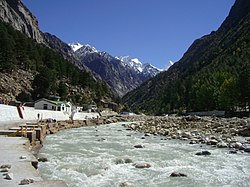
Indra is the king of the gods, devas and Svarga (heaven) in Hinduism. He is associated with the sky, lightning, weather, thunder, storms, rains, river flows, and war. Indra's powers are similar to other Indo-European deities such as Jupiter, Perun, Perkūnas, Zalmoxis, Taranis, Zeus, and Thor, part of the greater Proto-Indo-European mythology.
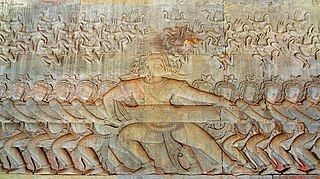
Asuras are a class of beings in Indic religions. They are described as power-seeking demons related to the more benevolent Devas in Hinduism. In its Buddhist context, the word is sometimes translated "titan", "demigod", or "antigod".

Vritra is a danava in Hinduism. He serves as the personification of drought, and is an adversary of the king of the devas, Indra. As a danava, he belongs to the race of the asuras. Vritra is also known in the Vedas as Ahi. He appears as a human-like serpent blocking the course of the Rigvedic rivers, and is slain by Indra with his newly-forged vajra.

The historical Vedic religion constituted the religious ideas and practices among some of the Indo-Aryan peoples of the northwest Indian subcontinent during the Vedic period. These ideas and practices are found in the Vedic texts, and some Vedic rituals are still practiced today. It is one of the major traditions which shaped Hinduism, though present-day Hinduism is markedly different from the historical Vedic religion.

David Frawley is an American author, astrologer, teacher (acharya) and a proponent of Hindutva.

Saraswati is the Hindu goddess of knowledge, music, art, speech, wisdom, and learning. She is one of the Tridevi, along with the goddesses Lakshmi and Parvati.

Subhash Kak is an Indian-American computer scientist and historical revisionist. He is the Regents Professor of Computer Science Department at Oklahoma State University–Stillwater, an honorary visiting professor of engineering at Jawaharlal Nehru University, and a member of the Indian Prime Minister's Science, Technology and Innovation Advisory Council (PM-STIAC).

Ushas is a Vedic goddess of dawn in Hinduism. She repeatedly appears in the Rigvedic hymns, states David Kinsley, where she is "consistently identified with dawn, revealing herself with the daily coming of light to the world, driving away oppressive darkness, chasing away evil demons, rousing all life, setting all things in motion, sending everyone off to do their duties". She is the life of all living creatures, the impeller of action and breath, the foe of chaos and confusion, the auspicious arouser of cosmic and moral order called the Ṛta in Hinduism.

The Vedas are a large body of religious texts originating in ancient India. Composed in Vedic Sanskrit, the texts constitute the oldest layer of Sanskrit literature and the oldest scriptures of Hinduism.
A Hindu wedding, also known as Vivaha, Marathi: Lagna (लग्न), Bengali: Bibaho (বিবাহ) Kalyanam or Pelli, is the traditional wedding ceremony for Hindus. The wedding ceremonies are very colourful, and celebrations may extend for several days. The bride's and groom's home—entrance, doors, wall, floor, roof—are sometimes decorated with colors, flowers, and other decorations.

Antyesti literally means "last sacrifice" or "final auspicious ceremony", and refers to the funeral rites for the dead in Hinduism, which usually involves cremation of the body. This rite of passage is the last samskara in a series of traditional life cycle samskaras that start from conception in Hindu tradition. It is also referred to as Antima Samskar, Antya-kriya, Anvarohanyya, or as Vahni Samskara.

In Hinduism, Rishabha is one of the twenty-four avatars of Vishnu in the Bhagavata Purana. Some scholars identify this avatar to be the same as the first tirthankara of Jainism, Rishabhanatha. Shaiva texts like the Linga Purana regard Rishabha to be among the 28 avatars of Shiva. Rishabha is also found in Vedic literature, where it means the "bull" and is an epithet for Rudra (Shiva).

Purusha suktam is an interpolated hymn added to 10.90 of the Rigveda at a later period. It is dedicated to the Purusha, the "Cosmic Being".

Ganga is the personification of the river Ganges, who is worshipped by Hindus as the goddess of purification and forgiveness. Known by many names, Ganga is often depicted as a fair, beautiful woman, riding a divine crocodile-like creature called the makara. Some of the earliest mentions of Ganga are found in the Rigveda, where she is mentioned as the holiest of the rivers. Her stories mainly appear in post-Vedic texts such as the Ramayana, Mahabharata, and the Puranas.
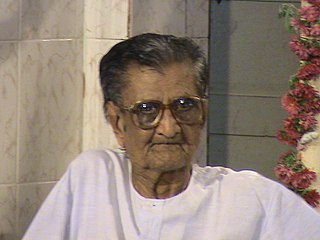
Pandit Sudhakar Chaturvedi was an Indian independence activist, Vedic scholar, Indologist, and claimed supercentenarian. At the claimed age of 122 years, 313 days, some Indian newspapers reported him as the oldest Indian ever.
Hindu atheism or non-theism, which is known as Nirīśvaravāda has been a historically propounded viewpoint in many of the Astika (Orthodox) streams of Hindu philosophy. Hindu spiritual atheists, agnostics or non-theists who affirm Vedas and Brahman, as well as those who follow astika (orthodox) philosophies but reject personal god(s), are also called Dharmic atheist, Vedic Atheist or Sanatani atheist. In current Indian languages, such as Hindi or Bengali, āstika and its derivatives usually mean 'theist', and nāstika and its derivatives denote an 'atheist'; however, the two terms in ancient- and medieval-era Sanskrit literature do not refer to 'theism' or 'atheism'. In ancient India Astika means those who affirms vedas, atman and brahman while nastika by contrast, are those who deny all the respective definitions of āstika; they do not believe in the existence of Self or Ishvara (God) and rejects Vedas. Sometimes nastika philosophies are also considered as a part of Hindu philosophy because the word 'Hindu' is actually an exonym and historically, the term has also been used as a geographical, cultural, and later religious identifier for people living in the Indian subcontinent. Many Scholars consider the Nāstika philosophies like Buddhism, Jainism and Charvaka as distinct schools of philosophies while some others consider them as part of Hindu Philosophy.
Sindhu Darshan Festival is a festival held in Leh, Ladakh, India. The festival is held every year in June on the full moon day of Guru Purnima. On this day, devotees gather near the banks of the Indus River, which is known as the Sindhu River in India. Since 1997, the festival has stretched for three days, attracting large number of foreign and domestic tourists.
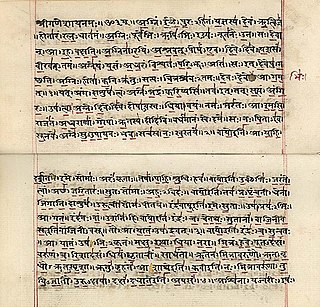
The Rigveda or Rig Veda is an ancient Indian collection of Vedic Sanskrit hymns (sūktas). It is one of the four sacred canonical Hindu texts (śruti) known as the Vedas. Only one Shakha of the many survive today, namely the Śakalya Shakha. Much of the contents contained in the remaining Shakhas are now lost or are not available in the public forum. Rigveda Samhita was composed in the northwestern region of the Indian subcontinent
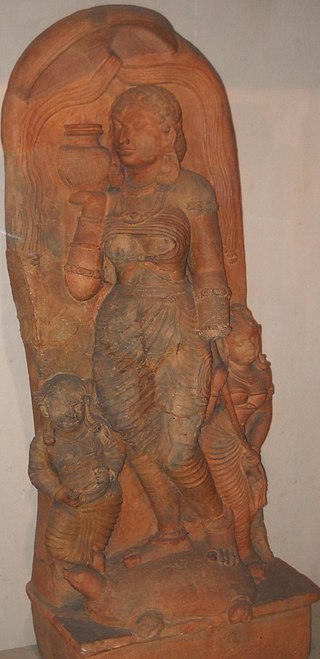
Yamuna is a sacred river in Hinduism and the main tributary of the Ganges River. The river is also worshipped as a Hindu goddess called Yamuna. Yamuna is known as Yami in early texts, while in later literature, she is called Kalindi. In Hindu scriptures, she is the daughter of Surya, the sun god, and Sanjna, the cloud goddess. She is also the twin sister of Yama, god of death. She is associated with the deity Krishna as one of his eight principal consorts, called the Ashtabharya. Yamuna plays an important role in Krishna's early life as a river. According to Hindu scriptures, bathing in or drinking Yamuna's waters removes sin.
Avatsara was a Rishi of the Rig Veda. His name first appears in the Fifth Mandala which is older than the Second Mandala.

